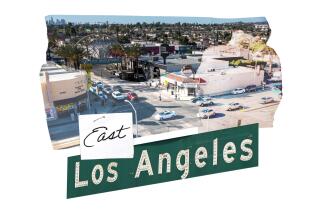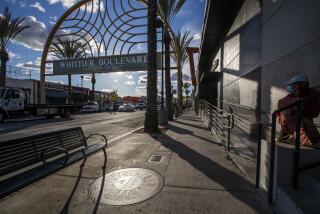Bill to Give El Segundo a $6-Million Tax Bonus
- Share via
El Segundo, which in recent years has struggled financially, will pocket close to a $6-million windfall under a bill signed this week by Gov. George Deukmejian.
Under the bill sponsored by Sen. Robert G. Beverly (R-Manhattan Beach), the city’s share of local property taxes will increase from 4.5% to 7% over three years instead of seven as called for under a state law passed last year.
The accelerated phase-in period means the city will collect an additional $5.9 million in property tax revenue over a five-year period beginning in 1990, according to El Segundo officials.
El Segundo officials had lobbied heavily for the passage of the bill, which was supported by the city’s business community. The legislation sailed through both chambers without opposition, and the governor signed it late Monday.
“I am really ecstatic, it is really neat,” Councilman Alan West said. “We have been working on it for a couple of years. . . . Little El Segundo with roughly four square miles finally got some equity.”
Legislation passed last year called for cities that had received little or no property tax to collect, by 1997, a maximum of 7% of the 1% county property tax, which is based on assessed valuation. A number of South Bay cities, including Rancho Palos Verdes, Rolling Hills and Rolling Hills Estates, benefited from the bill.
El Segundo officials, however, argued that their 7% share should be phased in faster because of the fiscal problems their city has experienced recently.
The problems date to 1981, when the Chevron oil refinery lost a major contract with Southern California Edison. The giant utility switched to natural gas and halted oil purchases from Chevron.
Revenues Dropped
As a result, sales tax revenues collected by El Segundo from Chevron plummeted, from $13 million during the 1981-82 fiscal year to about $3 million the next fiscal year, according to city figures. The Chevron tax revenue had represented about 75% of the city’s total tax revenue.
“They went from well-off to needy in a hurry,” Beverly said in an interview this week.
Because El Segundo has no major shopping centers or other large sales tax generators, the city has had to dip into its reserve accounts in recent years to balance budgets, and has been forced to delay major capital improvement projects.
Council members in July voted to raise three existing taxes levied on business to balance this year’s $23.7-million general fund budget. One increase doubled the employee tax to $120 per worker, while another quadrupled the square-footage tax to 20 cents a square foot.
The two increases are expected to bring the city about $6 million annually in new revenues, according to city estimates.
Councilman Bob Anderson said the city’s expected increase in property tax revenue may enable El Segundo to put some funds back into its reserve accounts.
However, the revenue will by no means solve the city’s long-term fiscal problems, he said. For example, the city in coming years will have to pay millions of dollars to the city of Los Angeles to pay for its share of the cost of expanding the Hyperion sewage treatment plant, Anderson said. El Segundo contracts with Los Angeles for sewage treatment.
“The (tax hikes) we have passed for this year . . . will take us out three or four years, and at that point, we are going to be back right where we are today,” he said.
More to Read
Sign up for Essential California
The most important California stories and recommendations in your inbox every morning.
You may occasionally receive promotional content from the Los Angeles Times.










